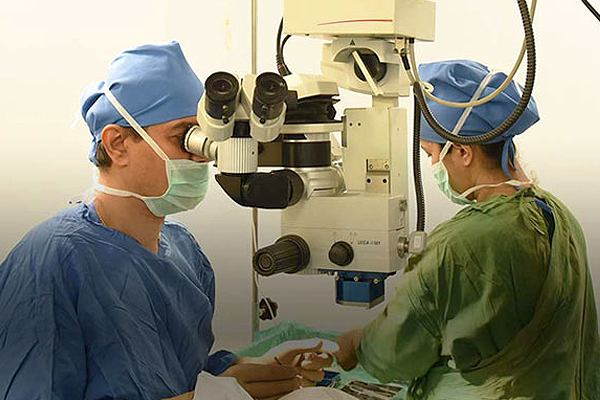
C3-R treatment to strengthen the cornea
The prior section in this website explained the cause of corneal weakening in keratoconus. Until recently, there was no method to change the integrity and strength of the cornea itself for keratoconus patients.
A non-invasive treatment C3-R (corneal collagen cross-linking with riboflavin) treatment has been proven to strengthen the weak corneal structure in keratoconus. This method works by increasing collagen cross-linking, which are the natural “anchors” within the cornea. These anchors are responsible for preventing the cornea from bulging out and becoming steep and irregular (which is the cause of keratoconus).
The figures above show the parallel corneal layers (white) and the collagen cross-linking (red) which are increased after C3-R treatment.
The 30-minute C3-R treatment is performed in our office and is a one-time treatment. During the treatment, custom-made riboflavin eyedrops are applied to the cornea, which is then activated by a special light. This is the process that has been shown in laboratory and clinical studies to increase the amount of collagen cross-linking in the cornea and strengthen the cornea. In published European studies, such treatments were proven safe and effective in patients.
The collagen crosslinking with riboflavin has its roots in dermatology. Doctors were looking for a way to strengthen sagging skin and realized that triggering collagen cross linking was the way to achieve this. The process was taken one step further by eye physicians in Germany who performed initial studies. They reported results of treatments done as long ago as 1998, so there is a good track record for this procedure. Links to these research publications can be found to the left side of this page. It is important to note in these studies that the proper dosages of the components are a very important part of the treatment. When used properly, there were no negative effects.
C3-R treatments can also be combined with Intacs to flatten the keratoconus cone even more than with Intacs alone. In these cases, C3-R treatments stablize keratoconus from getting worse as well as help the Intacs reverse the keratoconus steepening that had already occurred up to the time of the treatment.
The figure above demonstrates almost 10 diopters of corneal flattening in one patient before (left) after this combined treatment (right).
Natural progression of keratoconus in a patient’s eyes over 1.5 years. Notice the dramatic lower cone steepening (red) and increased astigmatism over this short period of time. C3-R can halt this progression and prevent these progressive distortions in vision. Note: not all keratoconus progresses this rapidly.
Dr. Boxer Wachler was the first doctor in North America to use C3-R treatments for keratoconus as well as being the first doctor in the world to combine this treatment with Intacs.
Copyright © 1987-2024 Ojas Eye Hospital All rights reserved | Privacy Policy
*Disclaimer: All information on www.lasikindia.com for informational purposes only and is not intended to be a substitute for professional medical advice, diagnosis, or treatment. Always seek the advice of your physician or other qualified health care provider.